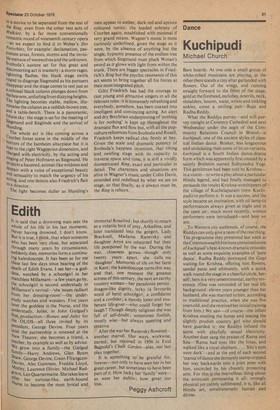Edith
It is said that a drowning man sees the Whole of his life in his last moments. Never having drowned, I don't know. But it is true, I think, that when someone Who has been very close, but separated through many years by circumstance, Suddenly dies, memories form a continuing kaleidoscope. It has been so for me these last few days since hearing of the death of Edith Evans. I see her—a goddess, watched by a schoolgirl in her Matchless Millamant—a few years go by, the schoolgirl is second understudy in illamant's revival—`she issues radiant from her dressing-room'—the understudy watches and wonders. Five years later the goddess is the Nurse, and the understudy, Juliet, in John Gielgud's first production—Romeo and Juliet for the OUDS—all three invited by its President, George Devine. Four years later the partnership is renewed at the New Theatre; she becomes a friend, a teacher, by example as well as by advice. ,We grow into a family—the Gielgud ,IanlilY—Harry Andrews, Glen Byam '11aw, George Devine, Gwen Ffrangcon'_avies, Alec Guinness, Freddie Lloyd, Motley, Laurence Olivier, Michael Redgrave, Leo Quartermaine. She takes leave after her tortoise-like, earth-bound Nurse to become the most lyrical and
immortal Rosalind; but shortly to return as a volatile bird of prey, Arkadina, and later translated into the gorgon, Lady Bracknell. Madame Ranevsky and daughter Anya are rehearsed but their life postponed by the war. During the war, closeness grows—though only twenty years apart, she calls me 'daughter'. Memories of life on her farm in Kent ; the kaleidoscope turns this way and that, one moment the greatest actress of this century, the next an earthy country woman—her paradoxes persist : dragon-like dignity, larky (a favourite word of hers) schoolgirl; a confidante and a confider; a moody loner and exuberant life-giver—who could forget her laugh ? Though deeply religious she was full of self-doubt: sometimes foolish, mostly wise--but always questing and creative.
After the war her Ranevsky flowered-another marvel. Our ways, workwise, parted; but rejoined in 1956 in Enid Bagnold's Chalk Garden—alas, our last play together.
It is something to be grateful for, forever—not only to have seen her in her great career, but sometimes to have been part of it. How lucky her 'family' were-as were her public; how great our loss.
Peggy Ashcroft










































 Previous page
Previous page